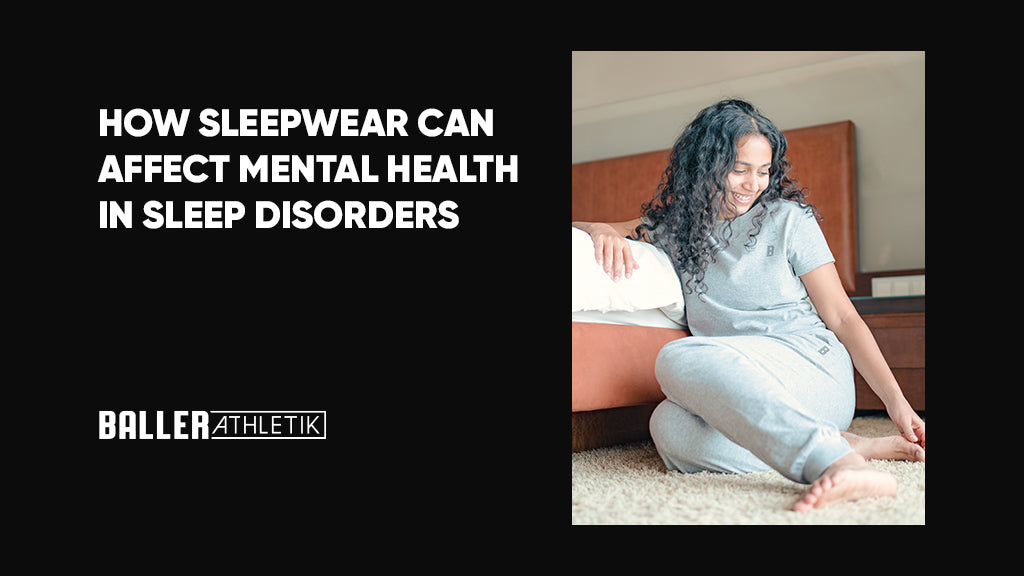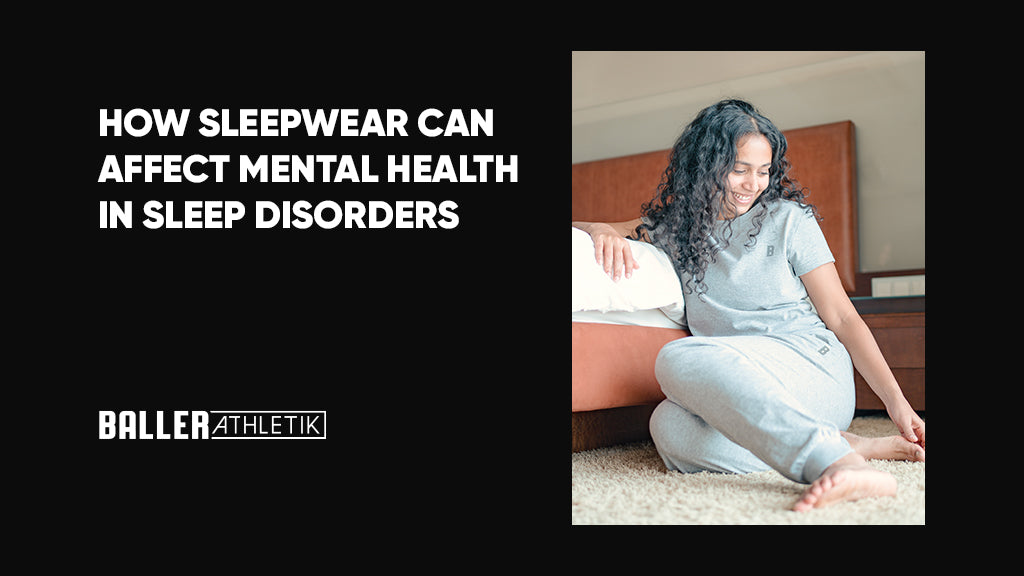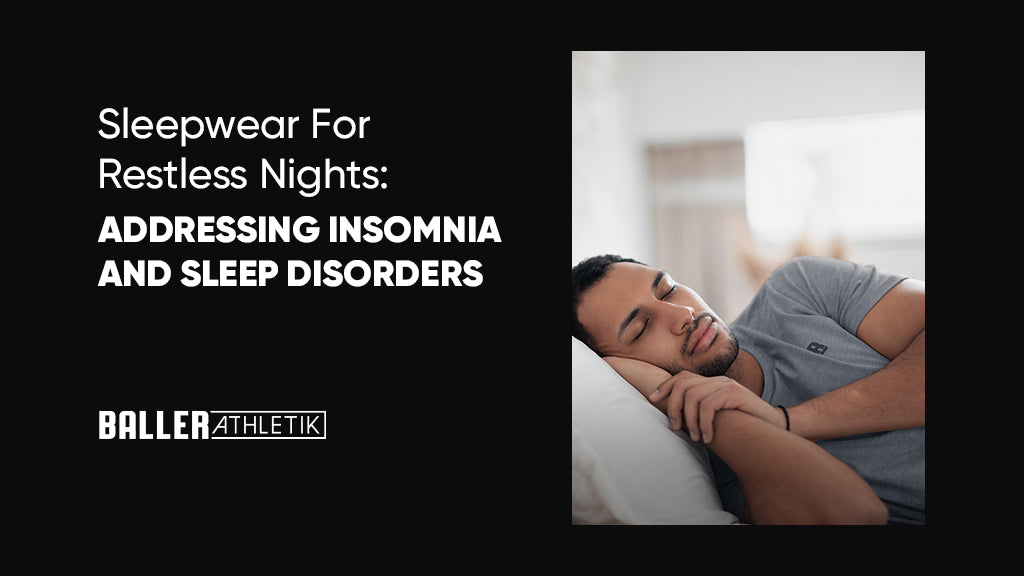Sleep disorders can have a significant impact on mental health, often leading to mood disturbances, cognitive impairment, and decreased overall well-being. In recent years, researchers have begun to explore the role of sleepwear in improving sleep quality and, consequently, mental health outcomes. This article aims to examine the connection between sleepwear and sleep quality, explore the psychological effects of sleepwear, discuss the relationship between sleep disorders and sleepwear choices, and provide insights into how selecting the right sleepwear can contribute to better mental health.
Understanding the Connection Between Sleepwear and Sleep Quality
When it comes to sleep quality, comfort plays a crucial role. After all, a comfortable sleep environment promotes relaxation and helps individuals fall asleep faster. Sleepwear, being an essential component of the sleep environment, influences how comfortable and at ease one feels when trying to drift off into slumber.
Studies have shown that choosing the right sleepwear can contribute to improved sleep quality. For example, loose-fitting garments made from breathable fabrics, such as cotton or bamboo, can enhance airflow and prevent overheating during sleep. On the other hand, sleepwear that is too tight or made from non-breathable materials, such as polyester, may lead to discomfort, sweating, and disrupted sleep patterns.
But what else should you consider when selecting sleepwear for optimal sleep quality? Let's dive deeper into the role of comfort and the impact of sleepwear material on sleep.
The Role of Comfort in Sleep Quality
Comfort is a subjective concept, as individuals have different preferences when it comes to sleepwear. Some people may find loose pyjamas more comfortable, while others may prefer the snug feeling of a sleep shirt. Ultimately, the key is to choose sleepwear that allows for ease of movement and doesn't restrict circulation.
But comfort extends beyond physical sensations. Psychological comfort also plays a role in sleep quality. Wearing sleepwear that makes an individual feel good about themselves can provide a sense of security and relaxation, promoting a more restful and rejuvenating sleep experience.
Consider the texture and fit of the sleepwear. Soft, smooth fabrics can enhance the overall comfort level, while rough or scratchy materials may cause irritation and discomfort. Additionally, paying attention to details such as waistbands, seams, and tags can make a significant difference in how comfortable the sleepwear feels against the skin.
The Impact of Sleepwear Material on Sleep
The material composition of sleepwear can significantly impact sleep quality. Opting for natural fibres, such as cotton, bamboo, or silk, is highly recommended. These fabrics are breathable, moisture-wicking, and hypoallergenic, which can help prevent skin irritations and promote a cooler, more comfortable sleeping environment.
Not only do natural fibres allow for better airflow, but they also have the ability to regulate body temperature. This is particularly beneficial for those who experience night sweats or fluctuating body heat during sleep. By choosing sleepwear made from natural materials, individuals can enjoy a more balanced and thermally comfortable sleep experience.
In contrast, synthetic materials like polyester and nylon tend to trap heat and moisture, leading to discomfort and potential skin irritations. Additionally, some people may have sensitivities or allergies to certain fabrics, highlighting the importance of choosing sleepwear made from materials that are suitable for an individual's specific needs.
It's also worth considering the environmental impact of the sleepwear materials. Natural fibres are often more sustainable and eco-friendly compared to synthetic materials, making them a conscious choice for those who prioritize sustainability in their lifestyle.
By understanding the connection between sleepwear and sleep quality, individuals can make informed choices when it comes to selecting the right sleepwear for a restful night's sleep. Prioritizing comfort and opting for sleepwear made from breathable, natural materials can contribute to a more comfortable and rejuvenating sleep experience.
The Psychological Effects of Sleepwear
While sleepwear undoubtedly influences physical comfort, its impact goes beyond surface-level sensations. What we wear to bed can affect our self-perception, mood, and overall emotional well-being.
When it comes to sleepwear, it's not just about the fabric and design; it's about how it makes us feel. The clothes we wear have the power to influence how we perceive ourselves, and this extends to sleepwear as well. Donning sleepwear that aligns with our personal style or makes us feel attractive can boost self-confidence and contribute to positive self-perception.
Imagine slipping into a luxurious silk nightgown or a cosy pair of flannel pyjamas that perfectly match your personality. The softness against your skin and the elegant or playful design can create a sense of comfort and empowerment. This positive self-perception can carry over into other aspects of life, enhancing overall well-being.
Conversely, wearing sleepwear that we find unappealing or uncomfortable may have the opposite effect. It can make us feel self-conscious or dissatisfied, leading to a negative self-perception. The psychological impact of sleepwear on self-perception highlights the importance of selecting sleepwear that supports positive body image and overall well-being.
Sleepwear and Emotional Well-being
It's no secret that sleep significantly impacts our mood and emotional state. Quality sleep is crucial for maintaining optimal mental health. Interestingly, sleepwear can also impact our mood and emotions.
Think about the feeling of slipping into your favourite pair of pyjamas after a long day. The familiar fabric against your skin and the comforting scent of freshly laundered sleepwear can create a sense of relaxation and well-being. This association between sleepwear and positive emotions can contribute to more restful sleep and a more refreshed mindset upon waking.
On the contrary, uncomfortable or unappealing sleepwear can disrupt our emotional well-being. Imagine trying to sleep in scratchy, ill-fitting pyjamas or a nightgown that feels constricting. The discomfort can lead to increased stress levels and decreased overall mood, making it harder to relax and fall asleep.
Choosing sleepwear that promotes comfort and relaxation can have a profound impact on our emotional well-being. Opting for breathable fabrics, loose-fitting designs, and styles that make us feel good can create a positive sleep environment and contribute to a more peaceful state of mind.
So, the next time you're shopping for sleepwear, consider not only the physical comfort it provides but also the psychological effects it can have. Choose sleepwear that makes you feel confident, comfortable, and emotionally supported. Your sleep and overall well-being will thank you.
Sleep Disorders and Their Relationship with Sleepwear
Several sleep disorders can greatly impact an individual's sleep quality, highlighting the need for appropriate sleepwear choices to mitigate their effects.
Insomnia and Sleepwear: Is There a Connection?
Insomnia, characterized by difficulty falling asleep or staying asleep, can be exacerbated by poor sleepwear choices. Sleepwear that restricts movement or causes discomfort may make it even more challenging for individuals with insomnia to find restful sleep. In contrast, selecting sleepwear that promotes relaxation and comfort can help individuals with insomnia improve their chances of obtaining better sleep.
Sleep Apnea and the Importance of Proper Sleepwear
Sleep apnea is a sleep disorder characterized by interruptions in breathing during sleep. Individuals with sleep apnea often rely on continuous positive airway pressure (CPAP) machines to manage their condition. Appropriate sleepwear is crucial in ensuring the effectiveness of CPAP therapy, as it needs to accommodate the mechanisms and provide a comfortable fit without interfering with the device's functionality.
Improving Mental Health Through Better Sleepwear Choices
The connection between sleepwear and mental health is becoming increasingly evident. Selecting sleepwear that promotes comfort, and psychological well-being, and suits the individual's specific needs can contribute to overall better sleep quality, leading to improved mental health outcomes.
Choosing the Right Sleepwear for Better Sleep
When selecting sleepwear, it's essential to prioritise comfort and personal preferences. Finding the right fit, fabric, and style that aligns with an individual's needs and preferences can greatly enhance sleep quality.
Experimenting with different sleepwear options and considering factors such as fabric breathability, moisture-wicking capabilities, and personal style can help individuals find the sleepwear that works best for them. Taking the time to choose suitable sleepwear can contribute to more consistent, restorative sleep, and improved mental health.
The Role of Sleepwear in Establishing a Healthy Sleep Routine
Establishing a healthy sleep routine is crucial for maintaining optimal mental health. Sleepwear can play a role in this process by signalling to our bodies and minds that it's time to unwind and prepare for sleep.
Creating a sleep ritual that includes changing into sleepwear can mentally prepare individuals for rest and relaxation. By consistently participating in this routine, individuals can establish a stronger association between sleepwear and sleep, allowing for a smoother transition into a restful state.
The Future of Sleepwear for Mental Health
As researchers continue to explore the connection between sleepwear and mental health, the future holds promising advancements and innovations in sleepwear design.
Innovations in Sleepwear for Enhanced Sleep Quality
Advancements in textile technology and fabric engineering are driving the development of sleepwear that actively enhances sleep quality. For example, temperature-regulating fabrics that adapt to the body's needs throughout the night are gaining popularity. These innovative sleepwear options can help individuals maintain a comfortable sleep temperature, leading to improved sleep quality and overall well-being.
Role of Baller Athletik Sleepwear
Baller Athletik Sleepwear, with its innovative infusion of Far-Infrared and Bioceramic technology, plays a pivotal role in addressing the intricate connection between sleepwear and mental health, particularly in the context of sleep disorders. Far-Infrared technology fosters improved blood circulation and relaxation, promoting a conducive environment for mental well-being during sleep. The Bioceramic infusion contributes to the body's natural healing processes, aiding in stress reduction and mental rejuvenation. By prioritising comfort and integrating advanced technologies into their sleepwear, Baller Athletik actively supports individuals grappling with sleep disorders, offering a holistic approach to enhancing mental health through the restorative power of a good night's sleep.
Sleepwear Trends and Their Potential Impact on Mental Health
Sleepwear trends, including the rise of loungewear and athleisure-inspired sleepwear, have the potential to positively impact mental health. These trends prioritize comfort, functionality, and personal style, emphasizing the importance of well-being and self-care in sleepwear choices.
By aligning sleepwear trends with mental health needs, individuals can embrace fashionable sleepwear options that prioritize both physical and psychological comfort, contributing to improved sleep quality and overall mental well-being.
Conclusion
As our understanding of the connection between sleepwear and mental health deepens, it becomes evident that sleepwear choices can significantly influence sleep quality and overall well-being. By prioritizing comfort, psychological well-being, and personal preferences, individuals can select sleepwear that supports better sleep and contributes to improved mental health outcomes. The future of sleepwear holds exciting potential for further enhancing sleep quality and prioritizing mental health in our daily lives.




